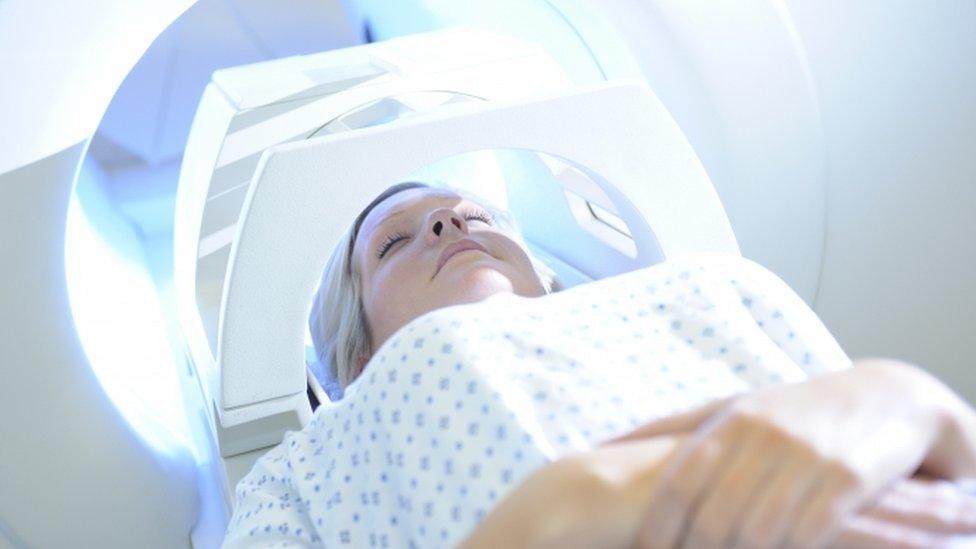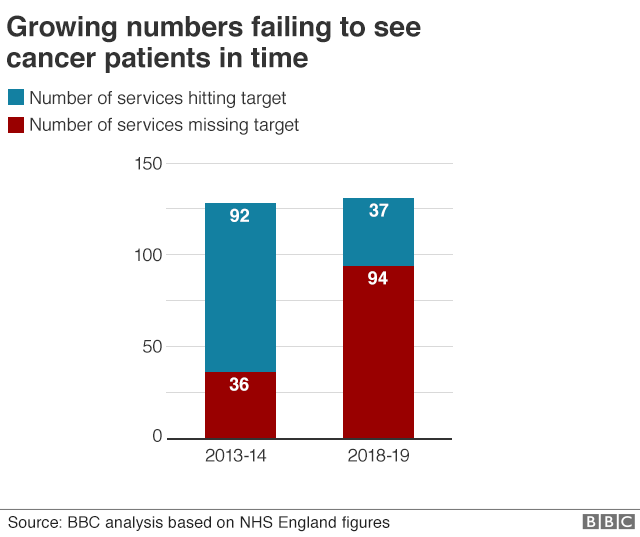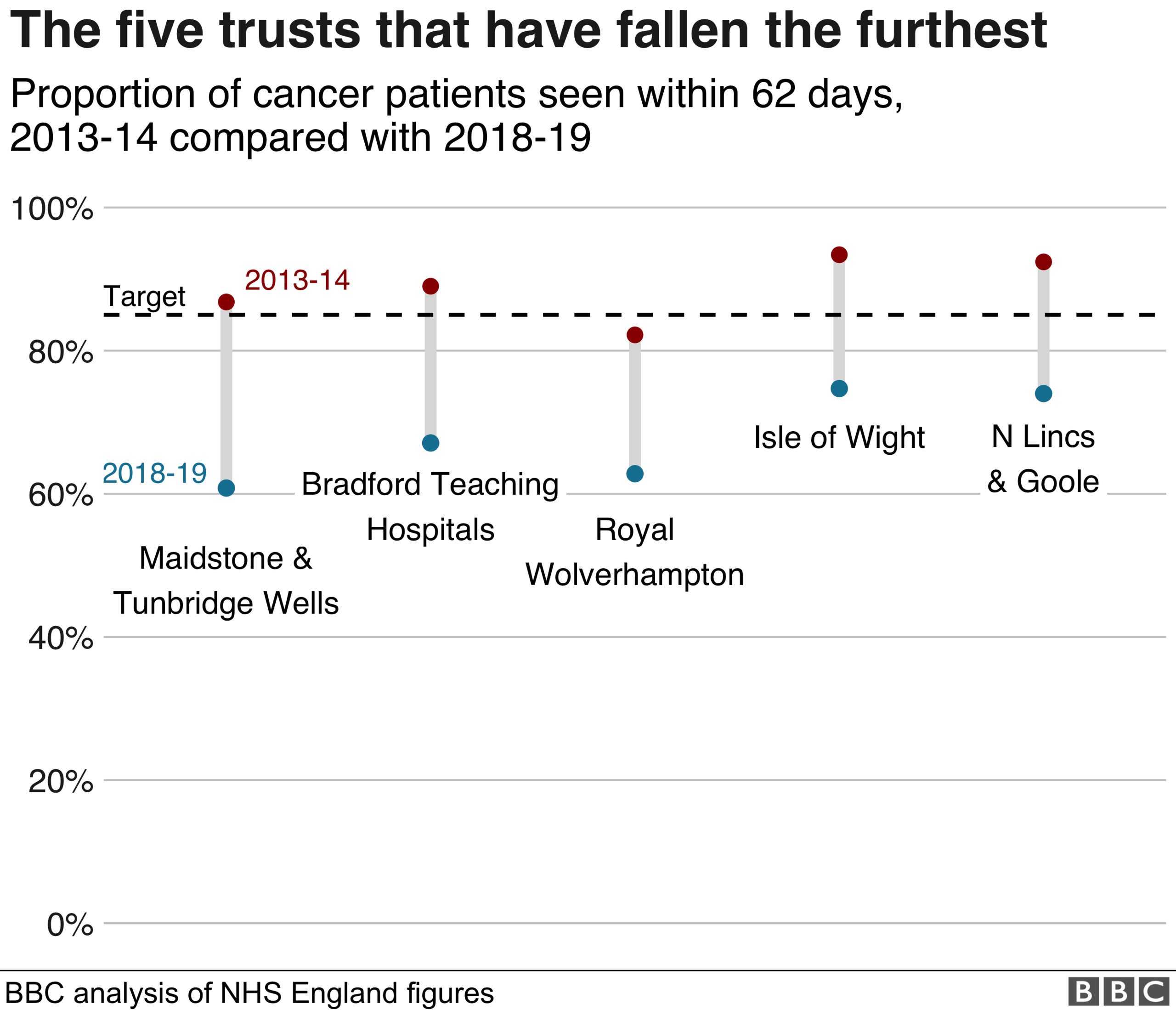The worst places for cancer care waits revealed
- Published

Nearly three-quarters of services are failing to treat cancer patients quickly enough, BBC research shows.
Hospitals are meant to start treatment within 62 days of an urgent referral by a GP in 85% of cases.
But 94 out of 131 cancer services in England failed to do that during 2018-19 - compared with 36 five years ago.
The worst performer was Maidstone and Tunbridge Wells NHS Trust, which saw fewer than 61% of patients within 62 days.
Bosses there said they had seen a surge in demand - above what other services had seen.
The trust said it had invested in extra staff and hoped to start hitting the target during the summer.

Other services have pointed to increased demand too, with the biggest regional centres seeing the most complex cases that tend to take longest.
But cancer charities said long waits put patients at risk.
Moira Fraser-Pearce, of Macmillan Cancer Support, said it was clear the service was "too stretched".
"The longer people have to wait for diagnosis and get treatment, the longer it will impact them, their health and wellbeing and just getting through that experience," she said.
Overall, across England, more than 32,000 patients waited longer than 62 days for treatment to start.
If you can't see the NHS Tracker, click or tap here, external.

The worst waits (% of patients started treatment in 62 days during 2018-19)
Maidstone and Tunbridge Wells 60.8%
Royal Wolverhampton 62.8%
Weston Area Health 67%
Southend University Hospital 67%
Bradford Hospitals 67.1%
University College London Hospitals 68.4%
Mid Essex Hospitals Services 68.5%
Hull and East Yorkshire Hospitals 69.2%
East and North Hertfordshire 69.2%
East Kent Hospitals 70.7%
And the best
Kingston Hospital 95.9%
Frimley Health 93.6%
Bolton 92.2%
Mid Cheshire Hospitals 92.2%
Tameside and Glossop 90.3%
Wrightington, Wigan and Leigh 89.5%
Dartford and Gravesham 89.5%
Chelsea and Westminster 89.4%
Epsom and St Helier 88.8%
Barnsley Hospital 88.7%
A total of 63 trusts have gone from hitting the target five years ago to now missing it, with Maidstone and Tunbridge Wells having fallen the furthest.

What is being done to address the problems?

Cancer was one of the priorities in the 10-year plan for the NHS unveiled earlier this year as part of the increase in investment being made in the health service.
The long-term plan made speeding up diagnosis a key focus - this is considered a major bottleneck in the system.
Rapid diagnostic centres - where patients can see a range of specialists in one place - are being rolled out.
Meanwhile, investment is being made in new scanners.
But cancer services are still waiting to hear how staff shortages are going to be resolved - this is believed to be one of the major reasons why hospitals have struggled.
Details of plans to boost the number of doctors and nurses in the system are expected to be unveiled later in the year.
NHS England said the health service was doing well in the circumstances, adding services had had to cope with a 15% increase in urgent referrals in the past year.
"Cancer survival is at an all-time high in England and that is because the NHS continues to put itself under pressure by ramping up the number of people who get checked so that more cancers are caught early when they are easier to treat," a spokeswoman added.
What about the rest of the UK?
Services in Scotland, Wales and Northern Ireland are also struggling to see patients within 62 days.
Figures for the whole of 2018-19 are not available yet.
But the most recent figures show 13 out of 14 Scottish health boards were not hitting their target.
Meanwhile, all five trusts in Northern Ireland and six boards in Wales are failing too.
How important is 62 days?
The target was introduced in England in 2008, and the rest of the UK shortly after.
Underneath the target are a number of "mini-targets" that make up the 62 days.
They include a 14-day target to see a cancer specialist following a GP referral - and a 31-day maximum wait from the decision to treat to that treatment starting.
It is not possible to tell exactly what impact waiting longer than 62 days has - much depends on the type of cancer and whether it is diagnosed at an advanced stage or not.
But government cancer strategies have always insisted meeting cancer waiting times is vital in order to "ease patient anxiety, lower the risk of complications and improve outcomes".
The government is looking at ways of changing the four-hour A&E target, but the 62-day cancer goal is being retained.